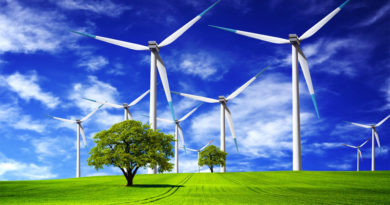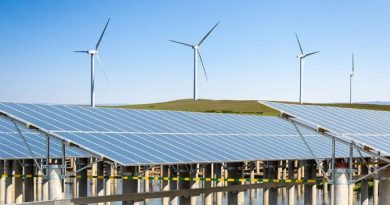IMF Policy Advice Undermines Global Climate Goals by Advising Countries to Invest in Fossil Fuels, says Report
 The Right Idea. Reality is opposite.
The Right Idea. Reality is opposite.
The International Monetary Fund (IMF) has undermined global climate action by promoting fossil fuel expansion through its policy advice, locking developing countries into a reliance on dirty coal and gas that is harming their economies and the planet, new research by ActionAid USA and the Bretton Woods Project finds.
The Bretton Woods Project is a UK-based NGO that challenges the World Bank and IMF and promotes alternative approaches.
The report “IMF Surveillance and Climate Change Transition Risks” is based on analysis of all 595 Article IV reports conducted in the IMF’s 190 member countries between the signing of the Paris Agreement in December 2015 and March this year. Article IV reports contain policy advice to countries that shapes their economies for years to come.
It finds:
- In more than half of all member countries (105) the IMF’s policy advice – since world leaders agreed to limit global warming to 1.5C through national action to reduce emissions – has supported the expansion of fossil fuel infrastructure. This leaves countries at risk of being left with ‘stranded assets’, such as coal plants that lose their value due to competition from clean energy, while setting a polluting pathway at odds with global climate goals and a just transition to renewables.
- In a third of countries (69), the IMF has advocated for the privatization of state-owned energy or electricity utilities to reduce public spending. Privatization can bind governments to long-term agreements with foreign investors and make it difficult for them to end fossil-based energy.
- A third of all countries were advised to end energy subsidies – an area that the IMF is increasingly positioning as a first step to decarbonizing economies. But the research found that the advice focuses mainly on consumer subsidies rather than ending benefits for fossil fuel production. With few alternatives to fossil-based energy and transport in most developing countries this is unlikely to reduce emissions at scale, while pushing costs onto the shoulders of ordinary citizens – rather than tackling the generous subsidies given to fossil fuel companies.
Analysis of advice provided to Mozambique found that the IMF overestimated the future growth from coal discoveries, predicting a “coal boom” that would make the southern African country one of the world’s leading coal exporters and leading to huge new revenues.
But in 2021, Mozambique’s main coal plant shut, with the operator Vale citing meeting climate goals as the reason. Revenues from coal have failed to meet the Fund’s projections and the country is facing a debt crisis, exacerbated by poor investments in fossil fuels and the impact of devastating climate disasters, including cyclones Idai, Kenneth and Eloise.
Similarly, IMF advice about revenue from gas exports has left Mozambique in further trouble after the French fossil fuel giant, Total, abandoned its LNG project earlier this year after the site was attacked in a deadly ambush by insurgents in the troubled Cabo Delgado region.
Meanwhile, IMF policy advice has largely ignored the potential macro-stability issues related to coal in Indonesia, despite the country’s heavy exposure to this fossil fuel. Indonesia has 52 coal plants at the pre-construction stage, second only to China globally. This overreliance on coal, presents a clear and immediate risk that the coal mines will become a stranded asset. One analysis of 2,500 coal plants globally found that 73% of coal mines will have lost their value by 2025.
Meanwhile, the Fund has pushed privatization of the energy sector. Indonesia is already exposed to potential liabilities from privately owned coal plants: The estimated value of Indonesia’s 12 coal-fired power stations protected by investor state dispute settlement agreements could be up to $7.9 billion.
The report comes as the IMF begins to integrate climate issues into its country surveillance mandate, which monitors countries’ fiscal policies, overall economic conditions and identifies key risks, through its Comprehensive Surveillance Review in May, and the launch of its new climate strategy in July.
Both commit to assessing climate change ‘transition risks’ – that is, the reduction in the value of fossil fuels and related infrastructure or assets, because of the low-carbon transition – in all countries. However, details on how the IMF will do this are yet to be developed.
The IMF’s shift towards climate issues will have important implications for member countries that receive its policy advice. But this presents a direct challenge to the IMF’s policy orthodoxy, which tends to be centred on ensuring reduced public spending and increasing export revenues, often through carbon-intensive sources.
Jon Sward, Environmental Project Manager of the Bretton Woods Project, says, “The International Monetary Fund has been a vocal supporter of the need for a low-carbon transition in recent months, but this report shows the IMF’s Article IV surveillance since the Paris Agreement was signed has largely supported business as usual, deepening many countries’ dependence on fossil fuels.
“As the IMF begins the process of creating new guidance for its staff on how to integrate climate change into its surveillance, it must develop new policy frameworks that are inclusive and ensure low- and middle-income countries have the fiscal space they need to deliver a just energy transition for their citizens.”
ActionAid and the Bretton Woods Project argue that the IMF should, at minimum, ensure its policy recommendations do not exacerbate inequalities or undermine countries’ efforts to act on climate.
One way the IMF should do this, the groups say, is to assess countries’ transition risks as the global economy shifts away from fossil fuels towards renewable energy – and to help mobilize resources for a just energy transition. The IMF should improve national level consultation on Article IVs, including with civil society organisations, women’s rights groups, trade unions, climate groups and indigenous peoples’ organisations, in an effort to integrate social dialogue into surveillance and the design of lending programmes.
Niranjali Amerasinghe, ActionAid USA Executive Director and climate finance expert, says, “The International Monetary Fund should ensure its policy advice makes it easier, not harder, for countries to transition to renewable energy. A just energy transition looks like policy frameworks that actually address inequalities. It looks like inclusivity and participation. It looks like transforming energy systems to work for people and the planet.”
Other recommendations from ActionAid and Bretton Woods Project include working towards eliminating subsidies for fossil fuel producers and increasing investments in renewable energy.




